
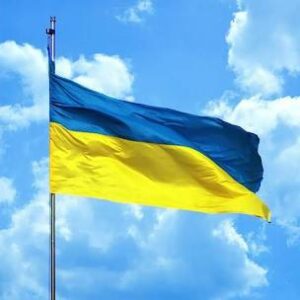
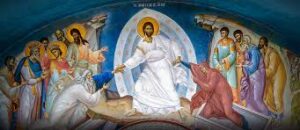
Christ is risen! Truly He is risen!

Saint Augustine of Hippo
commemorated on June 15
But…but… you say, today isn’t June 15. It’s May 15.
You are correct.
Explanation: senility?
Over the years I’ve made a long list of saints who I think would make interesting reading. Somehow I got Saint Augustine in the wrong month, and it wasn’t till I finished writing this Post that I realized it. Too late now for another one.
So let’s make a deal: I’ll allow you to read this Post now, only if you promise to read it again on June 15. OK?
We may proceed.
But two things before we begin.
1 Don’t confuse this Saint Augustine with Saint Augustine of Canterbury, Apostle to England.
2 The city in Florida is pronounced “Saint AUGustine”. The saint is “Saint AuGUStine”.
Saint Augustine of Hippo
I find Augustine to be a compelling and winsome man, both in his teachings and in his life. Let me show you first a sampling of his sayings.
Imagine yourself going to church on Sunday and hearing words like these:
“To fall in love with God is the greatest romance; to seek him the greatest adventure; to find him, the greatest human achievement.”
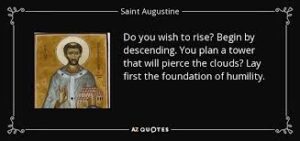
“Right is right even if no one is doing it; wrong is wrong even if everyone is doing it.”
“People travel to wonder at the height of the mountains, at the huge waves of the seas, at the long course of the rivers, at the vast compass of the ocean, at the circular motion of the stars – and yet they pass by themselves without wondering.”
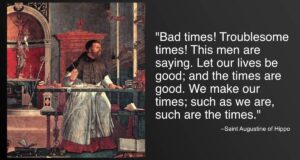
“The truth is like a lion; you don’t have to defend it. Let it loose; it will defend itself.”
“God has promised forgiveness to your repentance, but He has not promised tomorrow to your procrastination.”

“The world is a book and those who do not travel read only one page.”
“If you believe what you like in the Gospel, and reject what you don’t like, it is not the Gospel you believe, but yourself.”

“God provides the wind, Man must raise the sail.”
“Miracles are not contrary to nature, but only contrary to what we know about nature.”

“Without God, we cannot. Without us, God will not.”
“What then is time? If no one asks me, I know what it is. If I wish to explain it to him who asks, I do not know.”

“God loves each of us as if there were only one of us.”
“[O God,] You alone are the life which never dies and the wisdom that needs no light besides itself, but illumines all who need to be enlightened, the wisdom that governs the world, down to the leaves that flutter on the trees.”

“The desire for fame tempts even noble minds.”
“To sing is to pray twice.”
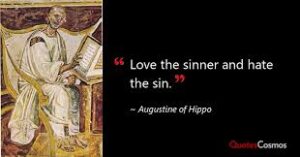
“The soul trained in love to God will do nothing to offend the One who is Beloved.”
“Understanding is the reward of faith. Therefore, seek not to understand that you may believe, but believe that you may understand.”
__________________________
I hope it’s not irreverent for me to say those sayings just “blow me away”. They are just a few * samples, a quick introduction to the measure of the man, his insights into life – especially our life with God, into human nature and so much more. At the end of this Post, I’ll cite other sources from which I’ve taken them.
- The source azquotes.com lists 253 notable quotations from Saint Augustine!
I confess that I have not read Saint Augustine – I wish we had done so in Episcopalian seminary – nor am I likely to do so in my old age. But let me share what little I’ve discovered about him.
Saint Augustine’s Life Story
I find this equally compelling.
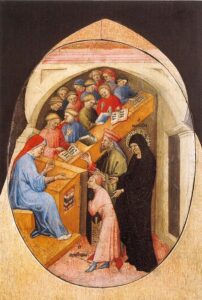
Augustine was born to Latin and Berber parents in the year 354, in Tagaste (now Souk-Ahras, Algeria) in Christian North Africa, as it was in those days. His father was a non-believer who is said to have converted on his death bed. His mother was Saint Monica, a devout Christian. Augustine was to become one of the Fathers of the Church and, in Roman Catholicism, formally recognized as a “Doctor of the Church” – their highest rank of theologian, of which there have been only 37 to date.
But to go back: Young Augustine followed in his father’s disbelief and sought a secular career. His inquisitive mind led him to many places. He taught rhetoric in Carthage, Tunisia, then later in Rome and Milan. All this time his mother Monica prayed fervently that her son would turn to Christ. For many years he followed the Manichaean religion, which held that matter was evil, only spirit is good. Meanwhile, contrary to his religion, he was living with a young woman * whose name we do not know, with whom he unintentionally fathered a son. They named the unexpected boy Adeodatus, “gift of God” – with a little help from his parents!
- There’s nothing new under the sun.
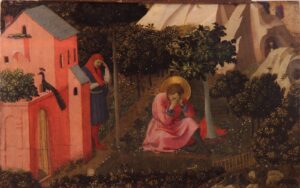
Augustine’s conversion was dramatic, as described in his autobiography, The Confessions of Saint Augustine, easily available from many sources. By the summer of 386, he was frequenting the Church, but still hesitant. While he was attending an all-night vigil in Milan, he took a break * and was sitting in a garden near the church. He heard a child’s voice repeating “Take it and read it, take it and read it…” He picked up a copy of Romans, opened it and read Romans 13:13-14: “Let us behave decently, as in the daytime, not in carousing and drunkenness, not in sexual immorality and debauchery, not in dissension and jealousy. Rather, clothe yourselves with the Lord Jesus Christ, and do not think about how to gratify the desires of the flesh.” Immediately he believed and felt called, unwillingly, to the celibate life. He wrote later that his prayer at the time was: “Lord, make me chaste. But not yet.”
- He wasn’t misbehaving. Ancient all-night Vigils were unlike our very ordered worship. It was common for people to take time-out for a while, if they felt like it – as I myself experienced at an all-night Vigil on Mount Athos, when we all went out for a much-needed snack, leaving only a couple of chanters to continue. (Forgive me for wandering.)
Saint Augustine was baptized by Saint Ambrose, Archbishop of Milan, during the Paschal Vigil in 387. In his Confessions he wrote that, looking back at his life, he had learned this: “You have made us for Yourself, O Lord, and our heart is restless until it finds its rest in You.”
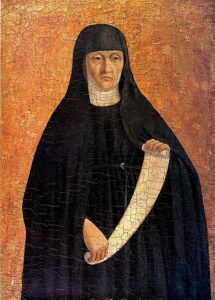
What happened to his companion and their son, you wonder? (Most accounts of Saint Augustine’s life never deal with this.) Becoming Christian and chaste were two steps too far for her. She returned to her family in North Africa. However, Adeodatus remained with his father and was baptized with him by Saint Ambrose. The two were close. He was with his father at the death of Saint Monica, his grandmother, and they shared their grief. He then returned to Africa with his father, who founded a small monastic community. In Augustine’s book De magistro he described his son as an exceptionally intelligent young man and as his close friend. Then suddenly, just before his eighteenth birthday, Adeodatus died. Augustine’s grief at his son’s death and his mother’s, coming so quickly, along with the loss of others of his friends, created in Saint Augustine a strong sense of the fragility of human life.
In 391 Saint Augustine was ordained to the priesthood in Hippo and quickly he became famous in the Western Church * as a preacher, well known for combatting the Manichaean and Pelagian heresies. More than 350 of his sermons have been preserved.
- His works were not translated into Greek until the 13th Century.
Only five years later, in 396, he became Coadjutor Bishop * of Hippo, and with the death of his superior the following year, Saint Augustine became Bishop of Hippo, and remained so for 34 years till his death.
- Western title for Assistant Bishop with right of succession
If you have time, you might read a series of letters between the younger Saint Augustine and the elder Saint Jerome, who had just produced the Vulgate translation of the Scriptures. Augustine contended that Jerome had sometimes not been true to the Greek Septuagint. Jerome obviously thought Augustine was a young “whippersnapper”. *
- See: https://www.bible-researcher.com/vulgate2.html
Saint Augustine continued to lead a monastic life. During his latter years, the Roman Empire as he had known it was clearly collapsing. This inspired his classic work The City of God, in which he wrote of the transience of all things human – that only the Kingdom of God endures.
Saint Augustine died on August 28, 430, just as Germanic Vandals * were at the gates of Hippo. He encouraged his people not to resist them, because they were Christians, albeit Arian Christians.
- After the Empire became firmly Orthodox/Catholic, the Arians went north into Germanic territory, where they had considerable success. I have a theory, based on no evidence whatsoever, that this was the root of the modern-day re-emergence of disbelief in Christ’s divinity in Protestant theology north of the Alps.
Saint Augustine’s Theology
Augustine was a Chalcedonian, Catholic and Orthodox Christian.
However, I began to worry when, in searching through his sayings, I came across these:
“Who can recall to me the sins I committed as a baby? For in your sight no man is free from sin, not even a child who has lived only one day on earth.”
“The only innocent feature in babies is the weakness of their frames; the minds of infants are far from innocent.”
Infants committing sins? Did he mean babies are guilty?
The problem, as so often, perhaps lay in the definitions. In New Testament Greek, the word for “sin” – I’ve run you through this often before – is ἁμαρτία / amartia – an archery term which means only “missing the mark”, which is love of God and neighbor. Amartia does not imply culpability. We can be off the mark for many reasons. The Latin word for “sin” is “peccatum”, which usually implies culpability – “You did it on purpose. You’re guilty.” So perhaps we were born guilty? I’m not sure Saint Augustine took it that far, but others did.
Here is a portion of an article about Saint Augustine’s theology, courtesy of The Orthodox Church in America, more thoroughly looking at differences in the view of “original sin”, East and West.
“In the Orthodox Faith, the term “original sin” refers to the “first” sin of Adam and Eve. As a result of this sin, humanity bears the “consequences” of sin, the chief of which is death. Here the word “original” may be seen as synonymous with “first.” Hence, the “original sin” refers to the “first sin” in much the same way as “original chair” refers to the “first chair.”
“n the West, humanity likewise bears the “consequences” of the “original sin” of Adam and Eve. However, the West also understands that humanity is likewise “guilty” of the sin of Adam and Eve. The term “Original Sin” here refers to the condition into which humanity is born, a condition in which guilt as well as consequence is involved.
“In the Orthodox Christian understanding, while humanity does bear the consequences of the original, or first, sin, humanity does not bear the personal guilt associated with this sin. Adam and Eve are guilty of their willful action; we bear the consequences, chief of which is death.”
from: https://www.oca.org/questions/teaching/st.-augustine-original-sin#:~:text=While%20the%20Orthodox%20Church%20does,known%20in%20the%20Christian%20East.
Medieval feudal society in Western Europe was rough. There was no central authority, so control lay largely in the hands of feudal lords. It was held that unless serfs repay their debts, they must be properly punished. (You’ve heard of “debtor’s prison”.) This gradually led to a new theological conclusion: Since mankind was unable to repay God sufficiently for our sins, God had to send us to Hell. But then Christ came and on the Cross “paid the price” of our debt, took on our punishment, so now God can free us and send us to Heaven. Twisted concepts of God our Father Who loves us, and of salvation. This is surely not what Saint Augustine believed, but the problem can be traced back to elements in his theology and to those who then followed and misunderstood them.
Here is an analysis of other aspects of Saint Augustine’s theology from the Greek Orthodox viewpoint: https://www.goarch.org/-/saint-augustine-greek-orthodox-tradition]
At the end of this article, I’ve added a Post “It was mostly Saint Anselm’s Fault” about how this worked out a few centuries later.
Is Saint Augustine really a saint?

The answer is Yes. “Sainthood” does not require perfection, whether in life or in theology. All Christian theologians, even the greatest, have made theological errors. We must not make gods of any of them. The Truth is found in the Holy Scriptures, interpreted by the consensus of the Fathers’ teachings.
Regarding the final personal sanctity of Augustine of Hippo there has never been any doubt.
Like all saints from the early years (and still in the Orthodox Church), Augustine’s “sainthood” was determined not through a system of ecclesiastical formalities, but was simply recognized by the people of the Church. The Fifth Ecumenical Council (Constantinople, 553) listed him among the Fathers of the Church. He was added to the calendar of the Russian Orthodox Church sometime during the so-called “Western Captivity” * of the Russian Church.
- Tsar Peter the Great loved and introduced all things Western, including theology. Did you know: In Russia in the 18th and 19th centuries, theology was taught in Latin! As late as 1990, a Russian monk tried to convince me of the Roman Catholic doctrine of Transubstantiation.
In later times Saint Augustine has been added to the calendar of the other Orthodox Churches.
In Western Christianity, Saint Augustine is commemorated on August 28, the day of his death. However, in the Holy Orthodox Church he is commemorated on June 15 *, for reasons I have not discovered.
- not on May 15, I hasten again to point out
Certain saints “take hold” of certain people for reasons that cannot readily be explained. Saint Augustine has done that with me this week. For one thing, here’s another saying of his:
“I count myself among the number who write as they learn, and learn as they write.” Yes.
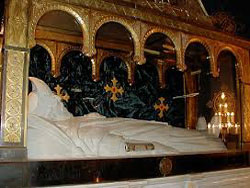
I am adding him to the list of people whose prayers I ask every night before I go to sleep.
Saint Augustine of Hippo, pray to Christ our God for the salvation of our souls.
P.S. I just now discover that there is an extensive article about Saint Augustine in Wikipedia. I learn from it that in 1967 Bob Dylan released a song “I dreamed I saw Saint Augustine”! and that in 2010 there was a television miniseries of his life. The article refers to 235 notes, only one of them Orthodox, and cites more authors than I care to count, none of them Orthodox, and also suggests many books for further reading, none of them Orthodox.
Next Week: Miscellany: Patriarch Bartholomew and his friend Pope Francis, Some wisdom from Gandalf, An Atheist learns about Theosis, and a few other things.
Week after Next: Saint Sophia, Mother of Orphans
_________
Sources of information for Post 535 (in addition to those mentioned above):
https://orthodoxwiki.org/Augustine_of_Hippo#Life
https://www.goodreads.com/author/quotes/6819578.Augustine_of_Hippo
Catholic news agency
bookroo.com
quotefancy.com 500!
Marylake.com
Wow!
Rich stuff, Father – many thanks!
This has clarified many things for me concerning St Augustine – the one Church Father beloved of many Protestants!